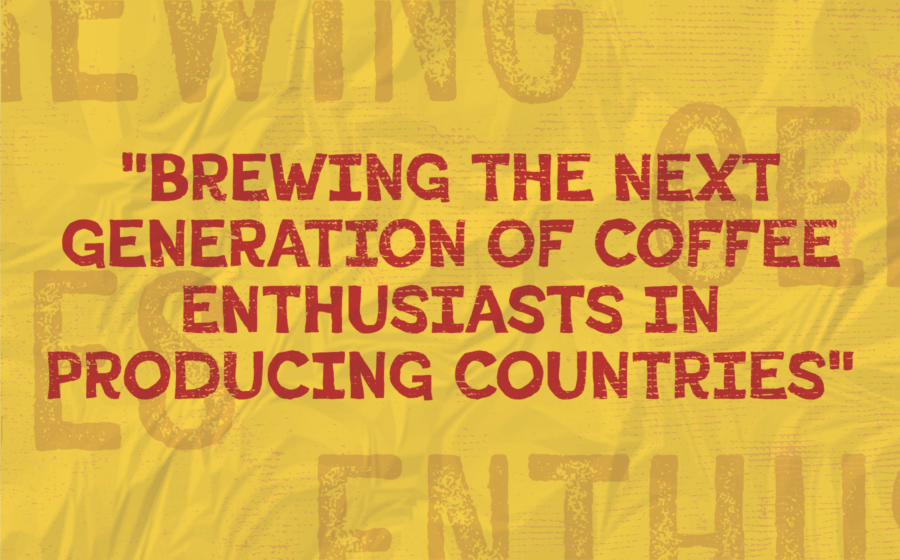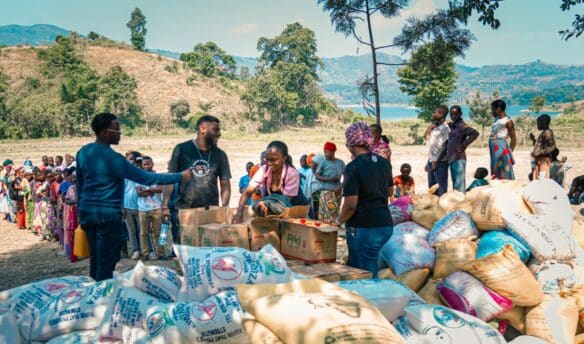Imagine you are a coffee bean growing inside a coffee cherry. You’re trying to take in as much water as possible—you need it to grow so you can fully develop, and be ready for picking, processing, and eventually roasting. But now, imagine the coffee plant you’re growing on just gets a sprinkling of water, and you’re fighting with the other coffee beans growing on your plant for that scarce resource.
In Kenya—where I’m from—imagine there are 43 million coffee beans, all fighting for the same resources. 85% of Kenya’s population is under 40 years old, and 40% of the population is unemployed. No matter which grade of bean you are, in Kenya, there simply isn’t enough water to go around.
That is unless you find a different plot to grow on. What if you found your own specialty, uncultivated land, which would offer more resources to help you grow and thrive? What if resources were abundant, and you didn’t need to fight so vehemently to secure your future?
What’s true for Kenya’s coffee beans is also true for the people who farm them. Studies show that the average age of coffee farmers in Africa is 60 years old, and the next generation is turning away from coffee growing in nearly every country that produces coffee. In Kenya, over the last quarter century, coffee production in the country has declined by 50%.
Researchers believe the key to solving these dynamics—and improving coffee production in the country—is through engaging young people. However, through my work as a sustainable farming advocate, author, and owner of Vava Coffee (a social enterprise designed to empower farmers), I’ve seen how young people are hampered by a lack of resources—like the coffee beans, many are entering a world with few tools and supplies to help them succeed.
So, how do we provide for, cultivate, and inspire young people in Kenya—and other producing countries—to engage with coffee? From giving them access to education by dismantling gender stereotypes to investing in innovation, there’s more than one simple answer.
Providing Practical Coffee Education
Now more than ever, young people need encouragement, guidance, and accessible opportunities that utilize Africa’s greatest resources: our land, our people, our agricultural potential, and our technological know-how.
Education is vital for the future of coffee in Kenya. For the Journal of Rural Studies, a group of researchers wrote an article exploring why coffee production is falling in Kenya, and concluded that “increasing the participation of young farmers in coffee production and creating an enabling environment for intensification can have a positive and sustainable effect on national production.”
In other words, there is immense potential in utilizing education to create various employment opportunities, from the farm to the cup.
Studies show that the average age of coffee farmers in Africa is 60 years old, and the next generation is turning away from coffee growing in nearly every country that produces coffee. In Kenya, over the last quarter century, coffee production in the country has declined by 50%.
When considering the most impactful and long-term coffee education programs that would benefit youth in producing countries, it’s worth being aware of the barriers. Cost is certainly one factor; other factors that inhibit education are a lack of technology, and little access to training equipment and literature.
With so many companies making sustainability pledges, I’d encourage businesses across the coffee supply chain to invest directly in producing countries, and help establish educational opportunities for young people. It will take investments from all industry players—especially the consuming countries that have abundant resources, and which dictate industry standards—to empower our young people with practical and technical training.
Overcoming Gender Norms
Access to coffee education is not gender-neutral. The International Coffee Association (ICO) estimates that while “between 20% and 30% of coffee farms are female-operated,” nearly 70% of the actual work done on farms is done by women.
The ICO also notes that women on coffee farms are still expected to perform domestic and household duties on top of their farming work, and identifies the disparity in domestic labor as “a main driver of disempowerment.” Given that, in many societies, women still perform the majority of traditional household responsibilities, coffee education opportunities must be tailored to meet different groups where they’re at.
When launching a coffee education project, it may be necessary to develop courses and educational goals that are both locally relevant and which take into account the different needs of women and men, as well as the fact that most youth in producing countries also support their immediate and extended families. Opportunities should be created with this in mind, and respect the cultural norms inherent in each country.
“A large proportion of East African coffee workers are women,” writes Peter Gakuo for Perfect Daily Grind. He goes on to say that despite the amount of labor women contribute to coffee, inequity is still an issue. Women are often not prioritized when it comes to formal schooling, and when it comes to coffee, they are often barred from joining cooperatives.
Instead of focusing on generating so-called solutions, we should focus on creating opportunities for young people and realize how much they’ve been robbed of when they face unemployment, poverty, and lack of job resources.
“In some coffee-growing countries, the exclusion of women in senior roles has been an institutional problem for some time now. For instance, some coffee co-operatives in the region implement policies and regulations which make women feel unwelcome, while others provide no growth opportunities for women,” writes Gakuo. “Furthermore, because of social and cultural traditions which require women to carry out the vast majority (if not all) of childcare and household duties, women often have little time to take part in other activities.”
The Role of Innovation and Technology
Coffee is grown in developing countries—often called “poor” countries by the so-called developed world—and many of the initiatives designed to help people in those producing countries focus on the wrong question. Instead of asking, “How can we eradicate poverty?” we should tweak the question and ask, “How can we create prosperity?”
If we frame the question this way, I believe we’d find that inequities in opportunity—and the lack of opportunities for young people specifically—are not resource problems but innovation problems. Many solutions pushed on people in coffee-producing communities are impractical because they’re unaffordable, and don’t address the root problem.
We need to foster more innovation. There is potential, for instance, in working closely with “citizen experts,” individuals who have the experience of working and living in a specific community. This is a term I came across while doing research on respecting the knowledge and contributions of local practitioners, and is a concept that would have a more sustainable impact. Empowering people—particularly young people—to help solve problems in their own communities is vital: They understand the issues and needs, and can provide practical solutions. They also already have the trust of their communities, and local know-how.
Instead of focusing on generating so-called solutions, we should focus on creating opportunities for young people and realize how much they’ve been robbed of when they face unemployment, poverty, and lack of job resources. In my work, one of the most crippling effects of unemployment that I’ve seen is the loss of self-esteem. There is a simple logic at work here: You create self-esteem by creating employment. And you create employment by using multi-pronged solutions that focus on education, innovation, and local expertise.





